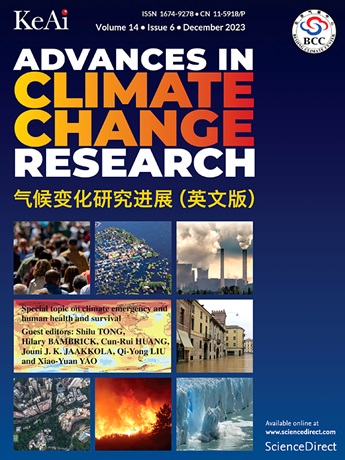气候变化下的科学土地绿化:理论、建模与挑战
IF 5.2
1区 地球科学
Q1 ENVIRONMENTAL SCIENCES
引用次数: 0
摘要
人为土地绿化是应对全球变暖危机的一项重要战略。然而,不断变化的外部环境和禀赋因素可能会制约土地绿化的效果。如何科学地量化和优化土地绿化战略仍是一个未知数。本文综述了国土绿化的理论基础,指出气候治理和人居质量提升逐渐成为20世纪以来国土绿化的两大核心目标。多源、多尺度的实验和观测调查是检测和评估气候变化背景下长期土地绿化的重要技术,特别是通过形成实验和观测网络。此外,还探讨了气候、人类和植被之间相互作用的理论机制。在建模方法方面,基于地球系统耦合理论的混合建模可能是最有前途但最具挑战性的方法。会议还讨论了科学绿化土地面临的四大挑战,包括与土地绿化机制有关的知识差距、土地绿化的多方面影响不明确、缺乏前瞻性定量评估以及评估目标之间的协同作用和权衡困难。在此基础上,提出了粤港澳大湾区科学绿化项目的战略框架,包括系统观测、机制研究、预期评估和科学规划。该综述强调了积极实施国土绿化项目的重要性,并基于前沿理论和方法为科学绿化提供了指导。本文章由计算机程序翻译,如有差异,请以英文原文为准。
Scientific land greening under climate change: Theory, modeling, and challenges
Anthropogenic land greening is a vital strategy to combat the global warming crisis. However, the changing external environment and endowment factors may constrain the effectiveness of land greening. It remains unclear how to quantify and optimize land greening strategies scientifically. This article reviewed the theoretical foundations of land greening, pointing out that climate governance and human settlement quality improvement have gradually become the two core objectives of land greening since the 20th century. Multi-source and multi-scale experimental and observational surveys are important techniques for detecting and evaluating long-term land greening in the context of climate change, especially by forming experimental and observational networks. The theoretical mechanisms of interactions among climate, humans, and vegetation were also explored. For modeling approaches, hybrid modeling based on Earth system coupling theory may be the most promising but challenging approach. Four main challenges of scientific land greening were also discussed, including knowledge gaps related to land greening mechanisms, unclear multifaceted effects of land greening, lack of forward-looking quantitative assessment, and difficulties in evaluating synergies and trade-offs among assessment targets. Based on these, a strategic framework was proposed, including systematic observation, mechanism research, expectation assessment, and scientific planning for scientific greening programs in the Guangdong–Hong Kong–Macao Greater Bay Area. This review underscored the importance of proactively implementing land greening programs and provided guidelines for scientific greening based on cutting-edge theory and methods.
求助全文
通过发布文献求助,成功后即可免费获取论文全文。
去求助
来源期刊

Advances in Climate Change Research
Earth and Planetary Sciences-Atmospheric Science
CiteScore
9.80
自引率
4.10%
发文量
424
审稿时长
107 days
期刊介绍:
Advances in Climate Change Research publishes scientific research and analyses on climate change and the interactions of climate change with society. This journal encompasses basic science and economic, social, and policy research, including studies on mitigation and adaptation to climate change.
Advances in Climate Change Research attempts to promote research in climate change and provide an impetus for the application of research achievements in numerous aspects, such as socioeconomic sustainable development, responses to the adaptation and mitigation of climate change, diplomatic negotiations of climate and environment policies, and the protection and exploitation of natural resources.
 求助内容:
求助内容: 应助结果提醒方式:
应助结果提醒方式:


